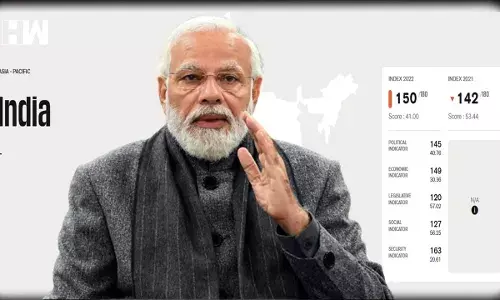New Delhi: According to Reporters Without Borders’ (RSF) 2022 World Press Freedom Index, India’s press freedom ranking has dropped from 133 out of 180 nations in 2016 to 150 in 2021.
The World Press Freedom Index measures how free journalists, news organisations, and internet users are in each country, as well as the government’s attempts to protect that freedom.
In the most recent assessment, India was ranked among the countries that are “poor” for media and among the most dangerous places for journalists in the world. It came in at number 142 out of 180 countries. Last year, India was ranked 150th.
“The violence against journalists, the politically partisan media and the concentration of media ownership all demonstrate that press freedom is in crisis in “the world’s largest democracy”, ruled since 2014 by Prime Minister Narendra Modi, the leader of the Bharatiya Janata Party (BJP) and the embodiment of the Hindu nationalist right,” the 2022 report said.
It further added, “Originally a product of the anti-colonial movement, the Indian press used to be seen as fairly progressive but things changed radically in the mid-2010s, when Narendra Modi became prime minister and engineered a spectacular rapprochement between his party, the BJP, and the big families dominating the media. The prime example is undoubtedly the Reliance Industries group led by Mukesh Ambani, now a personal friend of Modi’s, who owns more than 70 media outlets that are followed by at least 800 million Indians.”
It also highlighted how, “under the guise of combating COVID-19, the government and its supporters waged a guerrilla war of lawsuits against media outlets whose coverage of the pandemic contradicted official statements,” the government and its supporters “waged a guerrilla war of lawsuits against media outlets whose coverage of the pandemic contradicted official statements.” In June 2020, The Wire claimed, citing multiple media accounts, that 55 journalists had been imprisoned, booked, and threatened for covering COVID-19.
It also mentioned the harassment that Indian journalists experience for being too critical of the administration. According to the article, 13 journalists have been arrested and one has been slain since January 1.
On 5 February, an IED exploded near Karlakhunta bridge in Kalahandi district, some 400 kilometres west of Bhubaneswar, killing Rohit Kumar Biswal, a reporter and photographer for the Odia-language weekly Dharitri.
Internet shutdowns and the propagation of misinformation, according to IndiaSpend, have also contributed to India’s decline in the press freedom index over the previous five years.
“Terrifying coordinated campaigns of hatred and calls for murder are conducted on social media, campaigns that are often even more violent when they target women journalists, whose personal data may be posted online as an additional incitement to violence,” according to the RSF report on journalist safety. In Kashmir, where reporters are frequently harassed by police and paramilitaries, with some being held in “provisional” custody for years, the situation remains very concerning.
On January 1, 2022, various Indian Muslim women, including journalists, were posted for “auction” on ‘Bulli Bai,’ a Github app, with their images doctored and obtained without their permission. Hundreds of Muslim women were posted for “auction” in 2021 on a similar app called “Sulli Deals,” which was also stored on Github. ‘Bulli/Sulli’ are Islamophobic slurs directed at Muslim women. They are variations of the term ‘Mulli,’ which is frequently used by the right wing to troll Muslim women.
In a separately held investigation conducted by ‘The Wire’ reported that ‘Tek Fog,’ a sophisticated software used by political operatives linked with the BJP to spread misinformation on a large scale in India, targeted women journalists, particularly those whose work or posts contradicted the BJP’s official narrative.
The government has been exploiting the lack of a “airtight border between business and editorial policy,” according to the RSF research.
Therefore, the old Indian model of a pluralist press is being seriously challenged by a combination of harassment and influence, it claimed
As an independent media platform, we do not take advertisements from governments and corporate houses. It is you, our readers, who have supported us on our journey to do honest and unbiased journalism. Please contribute, so that we can continue to do the same in future.

